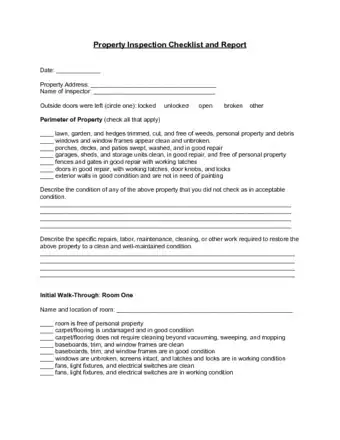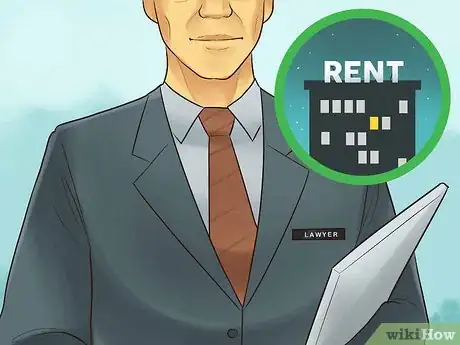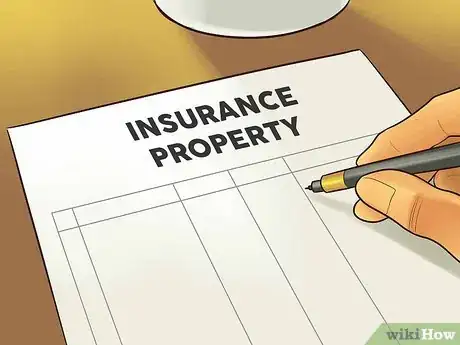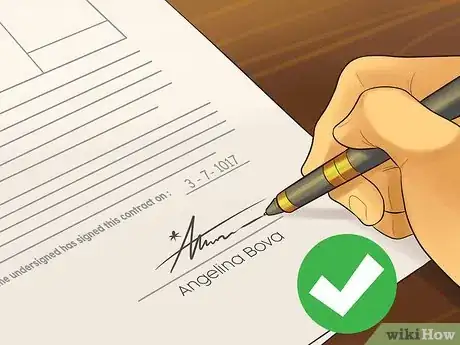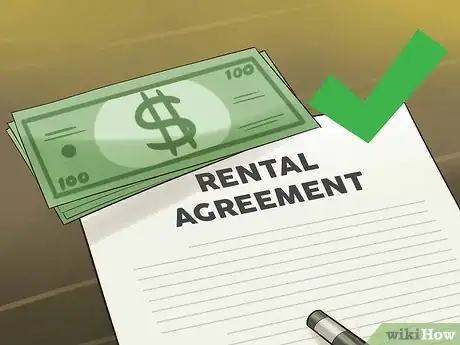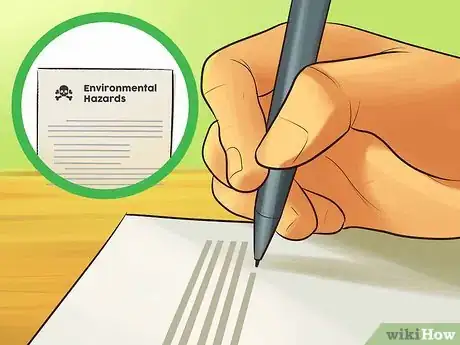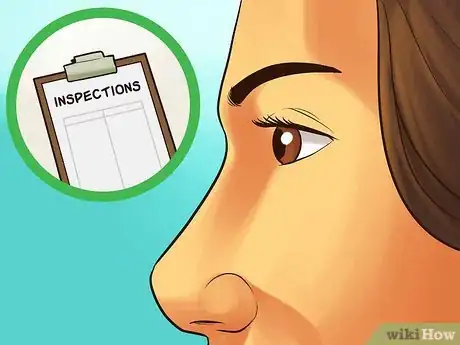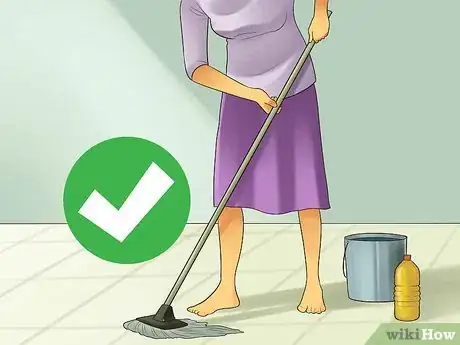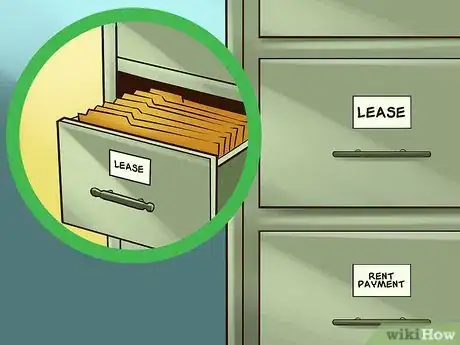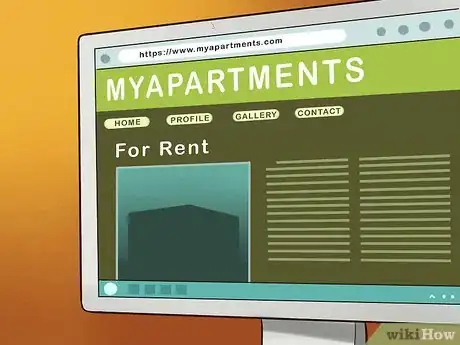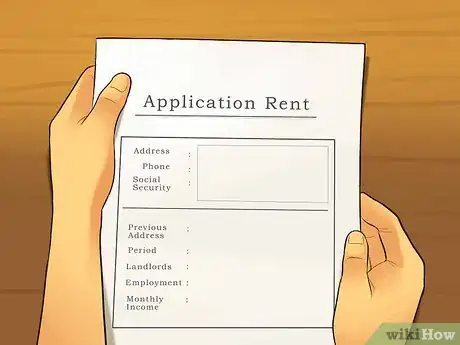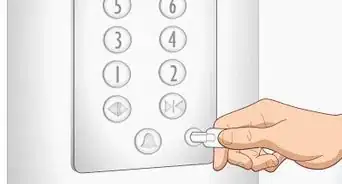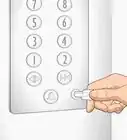This article was co-authored by Carla Toebe. Carla Toebe is a licensed Real Estate Broker in Richland, Washington. She has been an active real estate broker since 2005, and founded the real estate agency CT Realty LLC in 2013. She graduated from Washington State University with a BA in Business Administration and Management Information Systems.
This article has been viewed 60,457 times.
Renting an apartment can be an excellent money-making opportunity. Before you get started, work with a lawyer or property management company to help you understand the legal regulations and financial recommendations you need to follow to protect yourself and your tenants. If you find good tenants to rent to, you’ll be off to a great start. However, you should still regularly inspect your property and promptly handle any issues that arise on the premises. Communicate well with your tenants, and most of the time everyone will be happy.
Steps
Sample Rental Documents
Following Legal Protocols
-
1Find a good lawyer. There are strict rules governing housing in most areas, and regulations vary from location to location. To learn about the specific laws and regulations in your area, it’s best to get in touch with a good lawyer in your area who is familiar with the housing field. Let them know you are interested in managing apartments, and ask what relevant policies you need to know about.
- Lawyers may also be able to advise you on tax liabilities and potential credits related to renting property.
- To find a lawyer, you can begin by searching for something like, "landlord lawyer Los Angeles."
- You can also ask any lawyers you know if they can refer you to a lawyer who specializes in matters related to property and renting.
- Once you have one or more potential lawyers, set up a meeting with each. Talk to them about your plans for renting, and decide if they seem like someone you could work with. If so, talk with them about the services they can provide and the fees they will charge.
-
2Purchase insurance. Your entire property should be insured against loss, damage, and other issues. If you have employees managing or maintaining the property, make sure that they are also properly insured.[1]
- Check with a lawyer and/or insurance agent if you aren’t sure what kind of protection you need.
Advertisement -
3Write a lease. This is a legal contract that covers the agreement between the landlord and tenant. It is signed when a tenant and landlord agree to rent an apartment, and copies are kept for both parties. You can find lease templates online, or talk to your lawyer about what information to put in one. Most leases include things like:
- The names and signatures of the tenant(s) and landlord.
- The date the lease was signed.
- The starting and ending dates that the property will be rented
- Rent costs and due dates
- Policies on security deposits and lease termination
- Information on any environmental hazards present at the property
- Optional policies on things like subletting and any utilities included in the rent
-
4Ask tenants for a security deposit. This is usually used to cover expenses in the event that there are damages or other problems with the apartment when a tenant moves out. However, there are specific legal regulations governing how to collect, manage, and return security deposits (if the apartment is satisfactory upon move-out).
- Ask your lawyer to explain the policies regarding security deposits.
- You may be required to hold the funds in escrow while the tenant occupies the apartment, and return the deposit, minus any valid charges, within a certain time period, such as 30 days.
- Refer to the Landlord Tenant Act in your state or region to find out how long you have to return the deposit and/or a settlement statement.
-
5Let your tenants know about any environmental hazards. Many areas have laws that now require landlords to let tenants know if there is lead paint or plumbing in the apartment building. If there are other environmental hazards that tenants may be exposed to, let them know in writing. This will provide legal protection and let tenants make good choices.[2]
Maintaining Your Property
-
1Create a comprehensive budget. Managing an apartment can be a money-making opportunity, but there are costs involved. To make sure you stay financially afloat, create a budget. You can also work with an accountant for your financial matters. Budgets should detail:
- Your monthly rental income
- Monthly expenses (mortgage costs, fees for things like insurance and utilities, and taxes)
- Projected costs for maintenance and upkeep
- Money you keep in reserve to cover things like vacant apartments and advertising
- Funds set aside to help cover emergency expenses (such as damage from a storm, or a spike in mortgage costs)
-
2Hire a property management service. You can delegate some or all of your duties to a third party company that specializes in property management. Different agreements can be arranged: you can decide that a property manager will only oversee maintenance, for example, or that they will be responsible for everything from executing leases to collecting rent, to managing tenant issues.
- Property managers can make the process easier, but they will charge fees. Make sure you can factor this into your budget.
-
3Do regular property inspections. Whenever a tenant moves in or out, you should walk through and make sure the property is clean and in good condition. If there are any damages, appliances or fixtures that are not working properly, or other issues, make a note and look into correcting the problem. While tenants are living in the apartment, you should also perform regular inspections.
- You may be required to do inspections frequently (such as once a month), or infrequently (like once a year).
- Except in the case of emergencies, you must give your tenants 48 hours written notice before performing an inspection on the property. Refer to the Landlord Tenant Act for your area to learn more.
-
4Make sure tenants are doing their part. Tenants are normally expected to take care of some of the basic upkeep of an apartment. This includes things like keeping it clean, regularly taking out the garbage, using the property only for legal activities, following parking policies, and not allowing unofficial residents.
- Regular inspections should help you check on this.
- You can also distribute a regular tenant newsletter if you need to remind them of any policies.
-
5Keep the apartment secure and appealing. No one wants to live in an apartment that looks like it is run down or a target for thieves. Investing in a few things, like proper outdoor lighting and regular landscape maintenance, will keep your property looking cared for.[3]
- You can do some repairs and maintenance yourself if you know how and are qualified.
- Hire contractors for any major work, or when the tasks impact building codes or other regulations.
-
6Stay organized. Always keep records of all financial transactions related to the management of your property, including receipts and invoices. You should also maintain a file for each tenant that includes records of the lease, rent payments, and any other relevant information. Keeping tidy and comprehensive records will make sure that legal and financial matters are easily taken care of, saving you a lot of headache.
Managing Tenant Relations
-
1Advertise your rentals. Even in high-demand housing markets, advertising your availability is helpful. You want potential tenants to find out what apartment(s) you have, and how to get in touch with you about renting. Easy ways to advertise include:
- Posting availabilities on Internet classified sites
- Creating listings on apartment search websites
- Creating your own website and social media accounts to describe your rental(s)
- Asking a property management company or real estate agent to advertise for you
-
2Create a written application. Have any potential tenants complete this application and turn it in to you. You can also charge a small application fee to ensure your applicants are serious, and understand what is expected. The application should ask for things like:
- The applicant’s current address, phone number, and social security number.
- The tenant’s previous address, and how long they lived there.
- References (former landlords)
- Employment information
- A statement of monthly income
- Preferences for things like pets and parking (if relevant for your property)
-
3Run a background check and obtain a credit report for applicants. To ensure that you find tenants that won’t break the law or conduct illegal activities out of the property, you should run a background check on each applicant. Also, obtain a credit report for each applicant so you can determine if they are likely to be able to afford the rent payments and make them on time.
- Do an eviction search to find out if the applicant has been evicted before.
- Check the addresses on their application to make sure they match up with the applicant’s credit history report.
-
4Select good tenants. Fair housing laws dictate that you cannot discriminate against tenants based on race, sex, sexual orientation, etc. However, you should screen applicants to ensure that they are financially able to rent your property, and likely to take good care of it. Your criteria should be the same for all applicants, and keep records. Screening can include:[4]
- Asking for references (previous landlords, and personal references if necessary)
- Verification of income (like a recent pay stub) to show tenants will be able to meet the rent level
-
5Make sure the rules are clear. This protects you and your tenants, since everyone will have a clear record of requirements. The rental agreement or a separate set of rules can create good relations by specifying things like how much notice you will give tenants before entering the home for inspections. Likewise, if there are any shared areas, like a grill area or clubhouse, post rules for proper use.[5]
-
6Promptly handle any necessary repairs or upgrades. Tenants have a right to live in an apartment that is safe and functional. Ask your tenants to let you know as soon as possible if a pipe bursts, a ceiling leaks, an appliance gives out, or there is any other issue. Then, take care of these repairs right away. This will keep your property in good condition, and your tenant happy.[6]
- Give tenants a number where you or a manager can be reached 24/7 to handle any serious emergencies (like flooding).
-
7Listen to your tenants. If there are any issues, whether they involve costs, facilities, or resident life, hear your tenants out. Then work with them to reach solutions or compromises. Residents will be happier and more likely to renew rentals if they feel like they can communicate with their landlord.[7]
- If there are any serious, unresolved, or ongoing disputes, seek mediation or legal counsel.
-
8Take legal action when necessary. If you have tenants who consistently will not pay rent, conduct illegal activities on the premises, severely damage your property, or violate the lease agreement, you will need to take action. Talk to your lawyer about the proper way to proceed.
- In some cases, a mediator may be able to work with you and the tenant to reach a settlement or agreement on how to take care of the issue.
- In other cases, you may have to evict or sue the tenant.
Expert Q&A
-
QuestionWho do I contact to check for prior evictions?
 Carla ToebeCarla Toebe is a licensed Real Estate Broker in Richland, Washington. She has been an active real estate broker since 2005, and founded the real estate agency CT Realty LLC in 2013. She graduated from Washington State University with a BA in Business Administration and Management Information Systems.
Carla ToebeCarla Toebe is a licensed Real Estate Broker in Richland, Washington. She has been an active real estate broker since 2005, and founded the real estate agency CT Realty LLC in 2013. She graduated from Washington State University with a BA in Business Administration and Management Information Systems.
Real Estate Broker Prior evictions will show up on a credit report check. Also, a criminal background check may include a search for eviction filings and eviction judgments. The judgments will show up on the credit report if they are not expired.
Prior evictions will show up on a credit report check. Also, a criminal background check may include a search for eviction filings and eviction judgments. The judgments will show up on the credit report if they are not expired.
References
- ↑ http://www.nolo.com/legal-encyclopedia/ten-tips-landlords-29482.html
- ↑ http://www.nolo.com/legal-encyclopedia/ten-tips-landlords-29482.html
- ↑ http://www.nolo.com/legal-encyclopedia/ten-tips-landlords-29482.html
- ↑ http://www.nolo.com/legal-encyclopedia/how-screen-select-tenants-faq.html
- ↑ http://www.nolo.com/legal-encyclopedia/ten-tips-landlords-29482.html
- ↑ http://www.nolo.com/legal-encyclopedia/ten-tips-landlords-29482.html
- ↑ http://www.nolo.com/legal-encyclopedia/ten-tips-landlords-29482.html


